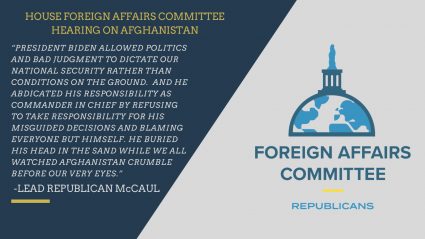McCaul: Biden Allowed Politics and Bad Judgment to Dictate our National Security
Washington, D.C.- Today, House Foreign Affairs Committee Lead Republican Michael McCaul questioned Former Deputy Secretary of State Richard Armitage, Former White House National Security Advisor H.R. McMaster, Former U.S. Ambassador to Afghanistan Ryan Crocker, Former NATO Ambassador Douglas Lute on the Biden Administration’s failed leadership in Afghanistan at a full committee hearing.
“President Biden allowed politics and bad judgment to dictate our national security rather than conditions on the ground. And he abdicated his responsibility as commander in chief by refusing to take responsibility for his misguided decisions and blaming everyone but himself. He buried his head in the sand while we all watched Afghanistan crumble before our very eyes.”
-Opening Remarks as Delivered-
Thank you, Mr. Chairman. This is the second in what I hope will be many public hearings and briefings as we begin the investigation into President Biden’s withdrawal from Afghanistan. President Biden and officials in his administration have continued to push the notion that only two options were available in Afghanistan: one, to fully withdraw in this chaotic and bloody way; or two, to keep tens of thousands of troops on the ground indefinitely.
But I believe this is a false premise. First, President Biden could have listened to his top generals who advised him to leave a small, counterterrorism force behind. This also would have enabled us to keep thousands of NATO troops. And no matter what the president has claimed in the media, it is abundantly clear that Generals Milley, McKenzie, and Miller all advised against a full withdrawal before the evacuation began. But even if the president wanted to withdraw all U.S. troops, he could have listened to Republicans and Democrats in the Congress – including many on this committee – who have begged him for months to take the necessary steps to mitigate the fallout our withdrawal would cause.
As one of our witnesses, Ambassador Crocker, and I wrote in our New York Times op-ed on May 4th, before the United States completed our withdrawal, it was vital that President Biden: one, set up agreements with neighboring countries to provide ISR capabilities; two, develop a clear strategy for protecting our embassy, staff and aid workers in order to continue our humanitarian assistance programs; three, honor the promises we made to our Afghan partners that fought alongside our troops– including our interpreters – through the Special Immigrant Visa program.
But, he did none of that. Instead, President Biden allowed politics and bad judgment to dictate our national security rather than conditions on the ground.
And he abdicated his responsibility as commander in chief by refusing to take responsibility for his misguided decisions and blaming everyone but himself. He buried his head in the sand while we all watched Afghanistan crumble before our very eyes. And as a result of President Biden’s failed leadership, 13 American service members were killed, with 18 more wounded. We have abandoned hundreds of American citizens and lawful permanent residents behind enemy lines. And we have left thousands of our Afghan partners behind – all with a bullseye on their backs and all at the mercy of the Taliban. If they are caught, they will surely be executed.
In other words, as General Milley said recently, our withdrawal from Afghanistan was a, quote, “strategic failure.”
This disaster has also created a very real long-term threat to our national security. The Director of National Intelligence admitted our intelligence capabilities have been diminished. The Deputy Director of the CIA and the Director of the Defense Intelligence Agency have said that al Qaeda could develop capabilities to strike the U.S. homeland within one to two years. And General McKenzie said before Congress last week that it is, quote, “yet to be seen” if we can prevent al Qaeda and ISIS from using Afghanistan to launch terror attacks into the U.S. and our allies.
On top of that, we have angered our allies, abandoned our partners and emboldened our adversaries. General Milley also said last week, our credibility is being, quote, “intensely reviewed” by both our allies and adversaries – and, quote, “damaged is one word that could be used” for our standing in the world.
So much is left to be uncovered and there are many lessons to be learned from this debacle. Ambassador Crocker, you and I met in Kabul during the surge when we had one hundred thousand troops on the ground. I remember visiting Kandahar, the birthplace of the Taliban, when Mullah Omar was hiding in Pakistan. You and I agreed that a light footprint of twenty-five hundred Americans – plus NATO forces – is a small price to pay for stability. And that any withdrawal should have been conditions-based. So, I deeply appreciate you, sir, and our other witnesses for appearing here today, to provide us with your insight.
Mr. Chairman, let me once again thank you for having this hearing and I look forward to many more in the future. With that I yield back.
###
